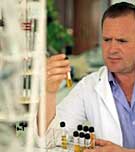Triglycerides: are the storage form of fats and the body's main source of energy.
|
Cholesterol: is a fatty, waxy, hard substance found in blood. Cholesterol is needed by the body to build strong cell wails, digest food, and make some hormones and vitamins.
There are two sources of cholesterol
| • |
The body produces cholesterol in the liver. |
| • |
Dietary cholesterol comes from animal foods. |
|
Litoprotein: Cholesterol and triglycerides do not dissolve in the bloodstream but must be carried by special proteins called lipoproteins.
The are 2 main types of lipoproteins:
| • |
Low-density lipoprotein (LDL). |
| • |
High-density lipoprotein (HDL) |
|
 |
Test |
What is it |
Goal |
| Total Cholesterol |
Blood fat |
< 200 mg/dL (5.17 mmol/L) |
| LDL Cholesterol |
Low-density
lipoprotein BAD |
< 80 mg/dL (2.07 mmol/L) |
| HDL Cholesterol |
High-density
lipoprotein GOOD |
Men: > 45 mg/dL
(1.15 mmol/L)
Women: > 55 mg/dL
(1.40 mmol/L) |
| Triglycerides |
Dietary fats in blood |
< 200 mg/dL (5.17 mmol/L) |
| • |
Saturated fats are found primarily in animal foods, such as meat whole milk dairy products, butter, and lard. These sources are usually solid at room temperature. Some plant sources of saturated fats are coconut and palm oil. |
| • |
Unsaturated or polyunsaturated fats mainly come from plants such as safflower, sunflower, corn and soybean. These are liquid at room temperature. |
| • |
Monounsaturated fats are found in olive oil, canola oil, peanut oil, olives, peanuts, and most nuts and seeds. |